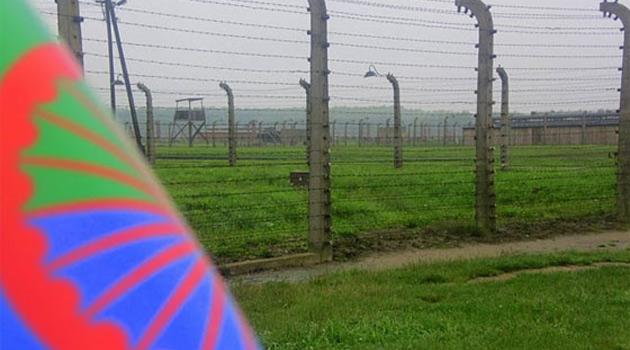Czech Republic: "Romani Resistance Days" to involve symbolic blockade of Lety pig farm, protest in Prague

The commemoration of Romani Resistance Day will begin on Friday 13 May with a symbolic blockade of the pig farm at Lety by Písek and will end on Monday 16 May with a demonstration in front of the EU House (Evropský dům) in Prague. The activists want politicians and the public not to forget the still shameful state of affairs at the sites where Czech Roma died in inhumane conditions during the Nazi occupation.
Romani Resistance Days Program
Friday, 13 May 2016 – at 15:00 in front of the main gate to the pig farm in Lety by Písek there will be a guided tour of the territories where the genocide happened and a prayer led by Mikuláš Vymětal.
Saturday, 14 May 2016 – at 14:00 there will be a funeral procession from the pig farm in Lety to the cemetery in Mirovice.
Monday, 16 May 2016 – International Romani Resistance Day – at 16:00 there will be a demonstration called "Europe, stop subsidizing the pig farm at Lety" on Jungmannova Street in Prague.
"We will begin our symbolic blockade of the pig farm on Friday, 13 May with a guided tour of the territories where the genocide happened. We will visit, for example, the quarry where the camp prisoners worked and died," organizer Miroslav Brož said.
On Saturday, 14 May, the program continues with a funeral procession from the pig farm in Lety to the nearby village of Mirovice, where the activists will lay flowers at the local cemetery on the graves of the children who died at the Lety camp, and will also light candles at the train station from which the trains transporting the prisoners to Auschwitz-Birkenau departed. On Monday, 16 May, to mark International Romani Resistance Day, demonstrators will assemble in front of the EU House (Evropský dům), the headquarters of the representation of the European Commission and European Parliament in the Czech Republic.
Representatives of the demonstrators will deliver their challenge, called "Europe, stop subsidizing the pig farm at Lety", at that place. Brož told news server Romea.cz that "We don’t have anything against the European Union per se – we are criticizing the state of affairs in which the European Structural Funds are subsidizing a specific agricultural enterprise that is located on those genocide sites. That, in our opinion, is absolutely incompatible with European values."
The activists will also deliver a manifesto to the EU representation. Called "Dignity for Lety", it has been signed by 83 MEPs and by hundreds of activists, artists and intellectuals from more than 30 countries in Europe and beyond.
Romani Resistance Day
Romani Resistance Day commemorates the events of 16 May 1944, when there was an uprising of Roma and Sinti at the so-called "Gypsy Camp" of Auschwitz-Birkenau. On that day the camp command had originally planned to murder all of the prisoners in that camp, but the imprisoned Romani people rose up and refused to obey the orders given by the SS members.
This historical event is all but unknown in the Czech Republic. Last year news server Romea.cz published a study about the Romani uprising at Auschwitz by historian Michal Schuster of the Museum of Romani Culture.
The events of 16 May 1944
everyone was banned from leaving the camp and that it would be closed. A truck drove up to the camp gates and 50-60 members of the SS special commando unit jumped out and called on the prisoners to quickly leave their living quarters.
The prisoners, however, refused to come out of their barracks. They reportedly remained absolutely calm.
They barricaded the doors and prepared to defend themselves with the aid of rocks and their work tools, since they had nothing else. Romani survivor Hugo Höllenreiner (born 1933 in Munich) had been deported to Auschwitz with his family in 1943 and recalled those moments of resistance as follows: "Outside there were definitely about seven or eight men who came to the gate. My Dad began to shout. The entire building trembled as he shouted: ‘We’re not coming out! You come in here! We’re waiting for you here! If you want something, you have to come in here!’"
The members of the SS commando unit were startled by this refusal to obey. Their commander decided to postpone the action.
The closing of the camp was called off that day. While there was never an open clash between the Romani prisoners and the SS members, the incident played a significant role.
It definitely was not the custom in the concentration camps for prisoners to resist en masse a planned, prepared action right before it was about to be carried out. There is absolutely no doubt that the armed SS commando unit could have suppressed the resistance, but that they decided not to go into open confrontation and preferred to achieve their aims another way.
This event, therefore, unequivocally was an uprising and occupies a significant place in the tragic history of the Holocaust of the European Roma. In the so-called "Gypsy Camp" at Birkenau there were approximately 6 500 prisoners at the time.
During the late night hours of 2 August 1944 and the early morning hours of 3 August 1944, all of the camp prisoners were murdered in the gas chambers.That is why 2 August is commemorated as Roma Holocaust Memorial Day.